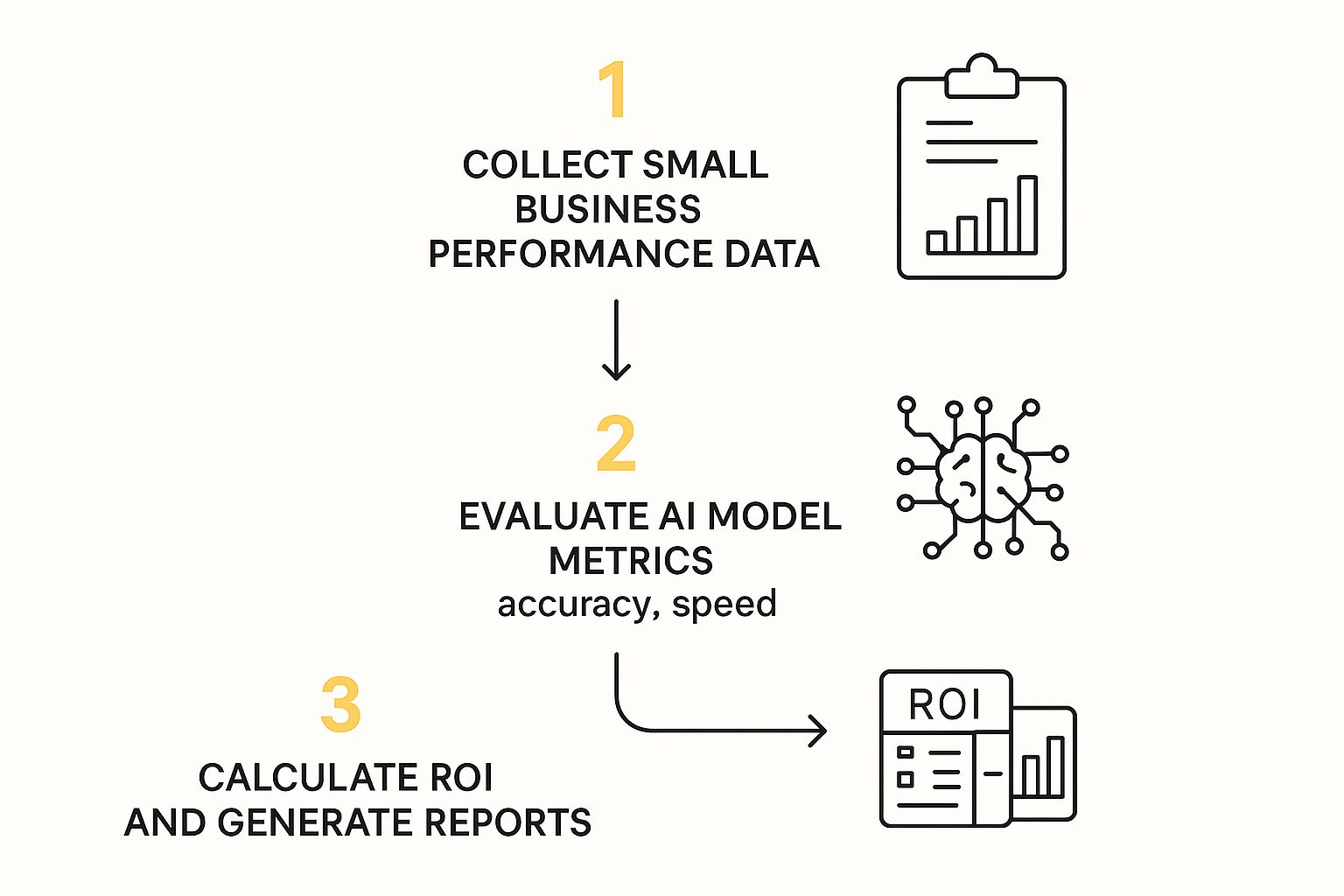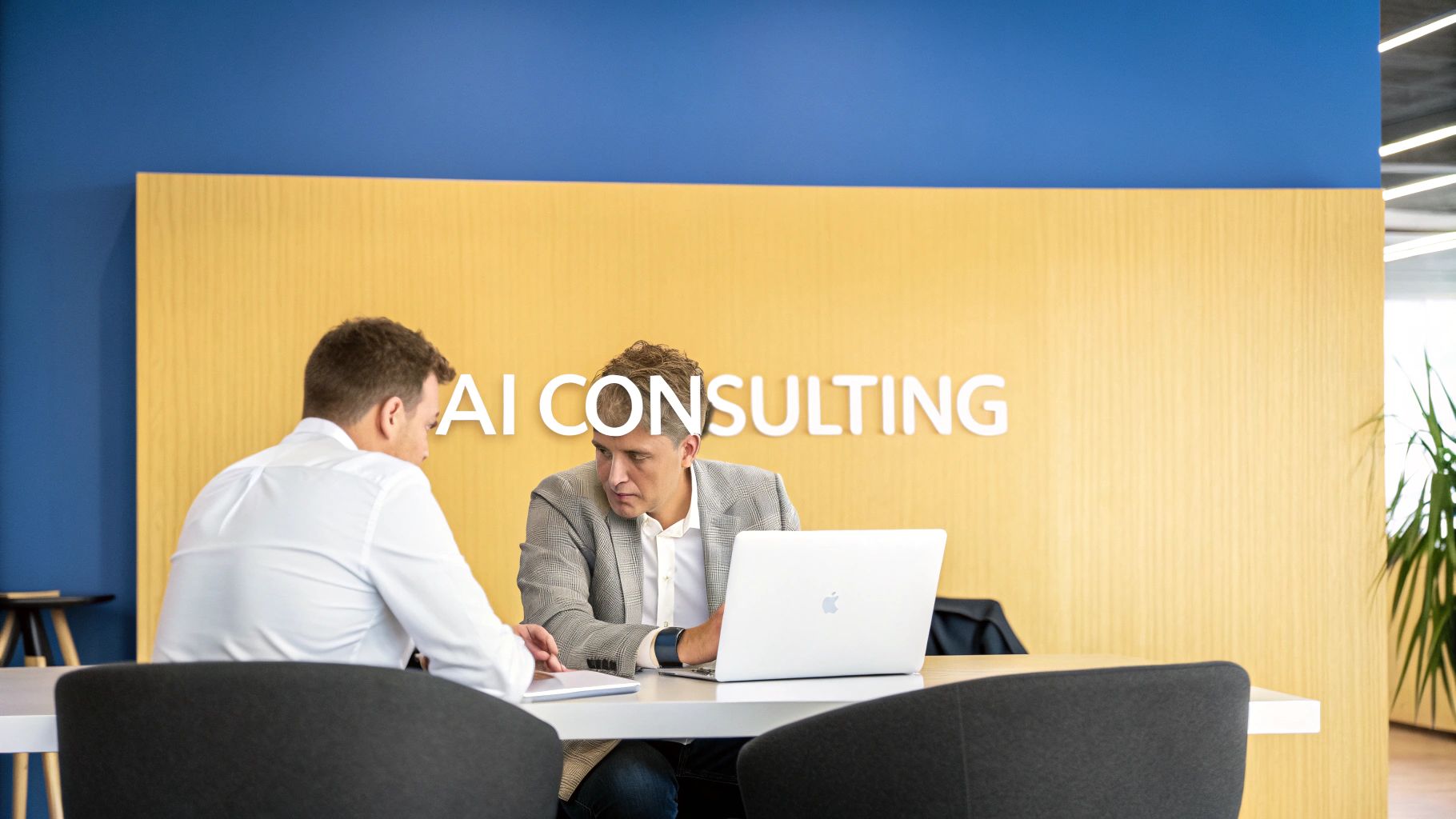The whole idea of "Artificial Intelligence" can feel like something reserved for tech giants with massive budgets. But the reality is, it’s quickly becoming one of the most powerful—and surprisingly accessible—tools for small businesses.
This is where AI consulting for small businesses comes in. Think of it as a bridge, translating complex technology into practical, real-world solutions that actually help you grow. It’s all about making smart tech work for you, not the other way around.
Why Your Small Business Is Ready for AI
If you’ve ever thought your business is "too small" for AI, it’s time to rethink that. AI isn't about futuristic robots or huge data centers anymore. It's about making your everyday operations smarter, faster, and way more efficient.
Think of it as hiring your most diligent employee—one who’s a genius at analyzing data, automating those repetitive tasks you hate, and spotting new opportunities 24/7.
And this isn't just a trend for the big players. The interest among smaller companies is exploding. A recent study showed that a whopping 79% of small firms are keen to learn about and adopt AI to make their businesses better. In fact, one in four small businesses is already actively using AI to keep up. You can dig into the specifics in this study on AI adoption among small businesses.
Turning Business Challenges into AI Wins
So, what does this actually look like on the ground? AI consulting cuts through the noise and focuses on your specific business headaches. It’s about turning your goals into practical, high-impact fixes that free up your team for the creative and strategic work that really matters.
Here’s what that could mean for you:
- Making Smarter Decisions: Use the data you already have to make better calls on everything from inventory and marketing spend to how you engage with customers.
- Boosting Your Team's Efficiency: Automate the routine stuff like canned email responses, scheduling, or data entry. Imagine getting all those hours back each day.
- Creating a Better Customer Experience: Use tools like chatbots to give customers instant answers to common questions, keeping them happy and coming back.
One of the easiest ways to see the potential is through things like marketing automation for small business. It's a perfect example of how you can streamline a core process to drive real growth.
To give you a clearer picture, we've broken down how AI can specifically benefit a small business.
Core Benefits of AI for Small Businesses at a Glance
This table sums up the key advantages small businesses can unlock by integrating AI with some expert guidance. It shows how AI isn't just a single tool, but a way to improve nearly every part of your operation.
| Benefit Area | Description | Example Application |
|---|---|---|
| Operational Efficiency | Automates repetitive, manual tasks, freeing up your team's time for more valuable, strategic work. | An AI-powered system automatically categorizes and responds to routine customer service emails, like password resets. |
| Data-Driven Decision Making | Analyzes your business data to uncover hidden patterns and insights, helping you make more informed choices. | Using AI to analyze sales data to predict which products will be most popular next quarter, optimizing your inventory. |
| Enhanced Customer Service | Provides 24/7 customer support and personalized interactions, leading to higher satisfaction and loyalty. | A chatbot on your website that instantly answers common questions about shipping, returns, and product features. |
| Marketing & Sales | Identifies high-potential leads and personalizes marketing messages, improving conversion rates and campaign ROI. | An AI tool that scores your leads based on their behavior, allowing your sales team to focus on the hottest prospects. |
Ultimately, AI isn't just about cool tech; it's about practical results. Whether you're trying to cut costs, serve customers better, or find new ways to grow, a targeted AI strategy can make a real difference.
The whole point of AI consulting for a small business isn't to install fancy technology for its own sake. It’s to solve real-world problems and deliver a return you can actually measure. It's about applying targeted intelligence right where it counts.
Instead of getting bogged down in technical jargon, a good consultant helps you pinpoint where a small dose of AI can create the biggest impact. Whether that’s optimizing your sales funnel or predicting your busiest seasons, the focus is always on tangible outcomes that strengthen your bottom line and set you up for the long haul.
What an AI Consultant Actually Does

Let's cut through the technical jargon for a minute. Think of it this way: if you wanted to renovate your office, you wouldn't just show up at a hardware store and start buying things. You’d hire a general contractor—someone who understands your vision, creates a realistic plan, and manages all the moving parts to get the job done right.
An AI consultant does the exact same thing, but for your company's digital operations. They’re the strategic partner who connects your business goals to the real-world possibilities of artificial intelligence. Their job isn't to sell you confusing technology; it's to solve your actual problems.
Simply put, an AI consultant is a strategic problem-solver. They diagnose your business challenges and prescribe the right AI-powered solutions to drive measurable growth, efficiency, and savings.
It all starts with listening. They want to hear about your biggest headaches. Are you buried in customer service emails? Struggling to forecast your inventory? This initial discovery is the most important part of any successful AI consulting for small businesses.
From Business Goals to AI Strategy
Once a consultant gets a handle on your pain points, they switch gears and become your guide. Their main job is to turn your broad objectives into a clear, step-by-step AI roadmap. It's a process that usually unfolds in a few key stages.
A good consultant will help you:
- Identify High-Impact Opportunities: They'll dig into your current workflows to pinpoint exactly where AI can deliver the biggest bang for your buck. This isn't about a massive, disruptive overhaul. It's about finding the "quick wins" that deliver the best return on your investment, fast.
- Select the Right Tools: The world of AI is noisy and crowded. A consultant’s job is to cut through that noise and find the software that fits your specific needs and budget, so you don't get stuck with something too expensive or complicated.
- Manage the Implementation: From working with developers to making sure new tools play nicely with your existing software, the consultant oversees the entire project. This frees you up to do what you do best—run your business.
This kind of hands-on guidance is what separates a successful AI project from one that fizzles out, goes over budget, or fails to deliver any real results.
Your Partner in Practical Problem-Solving
At the end of the day, a consultant's value is measured by the real-world problems they solve. They're business strategists first and technologists second. Their ultimate goal is to deliver concrete results you can see on your bottom line.
Here’s a quick look at how that partnership translates into tangible outcomes:
| Problem Area | How an AI Consultant Helps | Tangible Outcome |
|---|---|---|
| Overwhelmed Customer Service | Implements an intelligent chatbot to handle common queries like order status or FAQs. | 50% reduction in response times; happier customers. |
| Inefficient Marketing Spend | Uses AI to analyze customer data and pinpoint the most profitable segments for ad campaigns. | Higher conversion rates and a better return on ad spend. |
| Inventory Shortages or Waste | Deploys a predictive analytics model to forecast demand based on sales history and seasonal trends. | Optimized stock levels, less waste, and fewer lost sales. |
By zeroing in on these specific, measurable goals, a consultant makes sure your investment in AI isn't just another expense. It becomes a direct path to a more efficient and profitable business. To see how this strategic approach can be tailored for your own growth, check out our AI consulting services.
Real-World Wins with AI for Small Businesses

The theory behind AI is interesting, but what really matters is seeing it work in the real world for businesses just like yours. This isn't some far-off trend anymore; it's happening right now. A recent Salesforce report found that 75% of small and medium businesses are already putting money into AI. What’s even more telling is that businesses using AI are nearly twice as likely to see growth.
This isn't about chasing buzzwords. When we talk about AI consulting for small businesses, we're talking about getting real, measurable results. Let's move past the abstract ideas and look at a few concrete examples of how small businesses are getting a serious competitive edge with the right guidance.
The Bakery That Slashed Food Waste
Imagine a local bakery, famous for its fresh bread and pastries. Their biggest headache? Inventory. Every single evening, they were tossing out unsold goods, which meant throwing away revenue. Guessing how many loaves to bake each day was a constant, stressful struggle.
Working with an AI consultant, they set up a simple predictive analytics tool. This system looked at their past sales, factored in local event schedules, and even checked the weather forecast to predict how many customers would walk through the door. The accuracy was honestly surprising.
The result was a total game-changer:
- Within the first three months, they cut food waste by over 30%.
- They made sure popular items were always in stock, which made customers happier.
- The owner was finally freed from the daily guesswork and could focus on creating new recipes.
This is a perfect example of how a focused AI solution can solve a nagging, expensive problem. It wasn't some massive, complicated overhaul—it was one smart tool that delivered a clear return.
"The true power of AI for a small business lies in its ability to solve a specific, nagging problem. It’s not about overhauling your entire operation overnight, but about finding that one area where intelligent automation can make the biggest difference."
The E-commerce Shop That Reclaimed Its Time
A small e-commerce shop selling handmade jewelry was growing fast, but its two-person team was getting buried under customer service emails. They were spending hours every day answering the same questions about shipping times, return policies, and order tracking. It was draining.
Through AI consulting for small businesses, they put an intelligent chatbot on their website. The consultant helped them train the bot with their specific product info and company policies, so it could give out accurate, genuinely helpful answers.
The impact was immediate. The chatbot started handling over 70% of all customer questions on its own, 24/7. This freed up the owners to focus on what they actually loved doing: designing new jewelry, marketing their brand, and handling the more complex customer issues that really needed a human touch.
The Agency That Doubled Client ROI
A boutique marketing agency was having a hard time standing out from the crowd. They needed a way to get better results for their clients without having to hire more people or work around the clock. An AI consultant helped them integrate a platform that used machine learning to optimize their ad campaigns.
The AI analyzed thousands of data points in real time—adjusting ad spend, targeting, and messaging on the fly for maximum impact. Instead of running manual A/B tests that took weeks, the system could test hundreds of variations at once. This let the agency deliver hyper-targeted campaigns that blew their old efforts out of the water, in some cases doubling the return on investment for their clients.
These are just a handful of stories, but the theme is the same: with the right strategy, AI becomes a powerful ally, not a complicated burden. For more ideas on what's possible, you can check out our guide on specific AI solutions for small businesses.
How to Choose the Right AI Consultant

Picking the right strategic partner is hands down the most important decision you'll make on your AI journey. Get it wrong, and you're looking at wasted money and projects that go nowhere. But get it right? You'll have a massive asset for growth.
Think of this less like buying a piece of software and more like hiring a key team member. You're not just looking for a technical vendor; you need a genuine strategic guide. The goal is to find someone who's truly invested in your business outcomes, gets your unique challenges, and can turn complex tech into practical, profitable solutions.
Assess Their Industry Experience
Your first filter should be industry relevance. An AI consultant who’s only ever worked with huge enterprise clients probably won't get the resource constraints and scrappy agility a small business needs. You need someone who speaks your language and understands your world.
Don't be shy—ask them directly about their experience with businesses your size and in your industry. A consultant who knows the specific hurdles of a local retail shop or a growing e-commerce brand will be far more effective than one dishing out generic, one-size-fits-all advice. Their familiarity with your sector means they'll already know the common pain points and have proven solutions ready to go.
Review Their Portfolio and Past Projects
Talk is cheap. A portfolio is where the proof is. Any credible consultant will be excited to show you what they’ve done. When you're looking at their past projects, dig deeper than just the technical details. You're trying to understand the story behind their work.
- What was the original business problem they were hired to solve? This tells you if they focus on business goals from the start.
- What was the specific AI solution they implemented? Look for custom-fit approaches, not the same cookie-cutter tool for every client.
- What were the measurable results? They should be able to point to clear metrics—things like cost savings, efficiency gains, or real revenue growth.
This process gives you a clear window into their problem-solving style and, most importantly, whether they can deliver a real return on your investment.
A consultant's portfolio should read like a collection of success stories, not a list of technologies. The focus should always be on the business problem solved and the value created, demonstrating their role as a strategic partner.
AI Consultant Evaluation Checklist
To make this process easier, use this checklist to compare potential partners side-by-side. It will help you ask the right questions and spot the indicators of a great long-term partner.
| Evaluation Criteria | Key Questions to Ask | Ideal Response Indicators |
|---|---|---|
| Industry & Business Size Fit | "Can you share examples of work with businesses my size in the [your industry] sector?" | They provide specific, relevant case studies and speak fluently about your industry's unique challenges. |
| Problem-Solving Approach | "Walk me through a project where the initial plan had to change. How did you adapt?" | They describe a collaborative, flexible process and focus on the business outcome, not just the tech. |
| Measurable Results | "For a past project, what were the key metrics for success and how did you track them?" | They can point to concrete numbers like "15% reduction in manual data entry" or "10% increase in lead conversion." |
| Technical & Business Fluency | "Can you explain [a complex AI concept] as it would apply to my business?" | They explain complex topics clearly, using analogies that relate directly to your operations without excessive jargon. |
| Project Management & Communication | "What does your communication and reporting process look like during a project?" | They outline a clear cadence for updates (e.g., weekly check-ins), defined milestones, and transparent reporting. |
Going through these questions methodically will give you a much clearer picture of who you're dealing with and help you avoid a bad fit.
Understand Their Project Management Approach
How a consultant communicates and manages a project is just as critical as their technical skill. A badly managed project can fly off the rails fast, leading to frustration and budget overruns. You're looking for a partner who is transparent, organized, and works with you, not just for you.
When you're evaluating potential partners, looking at different consulting services proposal examples can give you a good sense of what a professional offer looks like. A solid proposal will clearly lay out timelines, milestones, communication frequency, and what they’ll need from your team. This sets clear expectations from day one and helps avoid painful misunderstandings later.
Watch Out for These Red Flags
As you talk to different consultants, keep an eye out for a few common warning signs. These red flags often signal someone who's more interested in a quick sale than your long-term success.
- Pushing a Single Tool: If a consultant immediately recommends a specific piece of software before they even understand your needs, they might be getting a commission for it. A true partner diagnoses before they prescribe.
- Promising Unrealistic Results: AI is powerful, but it’s not a magic wand. Be skeptical of anyone promising to "triple your revenue overnight" or making other guarantees that sound way too good to be true.
- Using Excessive Jargon: A great consultant makes complex ideas simple. Someone who hides behind a wall of confusing technical terms might not be able to connect the technology to real business value—or might not understand it well enough themselves.
- Lacking a Clear Process: If they can't clearly explain their process for discovery, strategy, and implementation, it’s a huge sign of disorganization. You want a roadmap, not a mystery tour.
Finding the right fit for your AI consulting for small businesses needs is all about making sure you have a partner who is genuinely aligned with your vision and committed to your success.
Your AI Implementation Roadmap
Jumping into an AI project can feel like planning a cross-country road trip without a map. Where do you even start? What are the key stops along the way? A good AI consultant acts as your experienced guide, laying out a clear, manageable roadmap that turns a massive undertaking into a series of achievable steps.
This roadmap isn't just about tech; it's about making sure every move we make is deliberate, tied directly to your business goals, and completely transparent. The whole process, from our first chat to the final rollout, is designed to cause as little disruption as possible while getting you the best return.
Phase 1: Discovery and Audit
The first phase is all about listening. Seriously. A consultant’s initial job isn’t to sell you on a fancy tool, but to get a deep understanding of how your business actually works. Think of it as a diagnostic check-up for your operations. We’ll talk about your biggest headaches, your loftiest goals, and the systems you’re already using.
During this phase, we'll dig into questions like:
- What are your biggest operational headaches? Which tasks eat up the most time or lead to the most frustrating errors?
- What are your main business goals? Are you trying to slash costs, drive more sales, or make your customers ridiculously loyal?
- What data and systems do you have? What information are you already sitting on, and what software do you use every day?
This audit is absolutely critical. It’s where we pinpoint the highest-impact opportunities—the "low-hanging fruit" where AI can score a quick and meaningful win for your business.
Phase 2: Strategy and Planning
Once we have a solid grasp of your business, the consultant switches hats from diagnostician to architect. This is where a fuzzy idea gets hammered into a concrete project plan. The consultant will lay out a tailored AI strategy with specific, measurable goals.
A well-defined AI strategy is the blueprint for success. It connects every technical decision directly back to a business outcome, ensuring the project stays focused on delivering tangible value, not just implementing technology.
This plan is a collaborative document, not a technical decree. It will detail the recommended tools, a realistic timeline, a clear budget, and the key performance indicators (KPIs) we'll use to measure success. Your job here is to give feedback and make sure the plan lines up perfectly with your vision. This is the time to ask every question you have so you're completely comfortable with the path forward before any of the real technical work kicks off.
Phase 3: Implementation and Integration
This is where the rubber meets the road. The consultant takes the lead on the entire technical execution, acting as the project manager to keep everything on track. This might mean setting up an off-the-shelf AI tool, overseeing the creation of a custom model, or getting new software to play nicely with your existing systems.
A key step here is getting your data ready. You can get a better sense of why clean data is so vital by understanding the role of data parsing in data management—it’s the foundation for any successful AI project.
This infographic shows how we turn raw data into measurable returns.

As you can see, raw business data gets collected, analyzed by the AI, and then turned into actionable ROI reports, completing the value cycle.
Phase 4: Training and Optimization
Launching the AI solution is a huge milestone, but it’s not the finish line. This final phase is all about making sure the new technology actually sticks and keeps delivering value for the long haul. A big part of that is training your team so they can use the new tools confidently and effectively.
On top of that, AI systems aren't a "set it and forget it" deal. They need ongoing monitoring and tweaking to perform at their best. The consultant will keep a close eye on the KPIs we set back in the planning phase, fine-tuning the system to improve its accuracy and impact over time. This cycle of continuous improvement is what turns a one-time project into a lasting edge over the competition.
The data backs this up. AI helps save an average of 2.5 hours per day for each employee, and 66% of business owners have brought in specialists to make sure those benefits are realized. By following this structured roadmap, the complex process of bringing AI into your business becomes clear and manageable.
If you’re ready to map out your own path, you can get started with a free consultation.
Answering Your AI Consulting Questions
Even with a clear plan, taking the first step into AI can bring up a lot of questions. It's totally normal. You’re probably wondering about the real-world details—cost, time, and whether this whole thing even makes sense for a business your size.
This section gets right to the point. We're going to tackle the most common concerns we hear from small business owners, giving you straight answers so you can feel confident about what’s next.
Is My Business Too Small for AI Consulting?
Let's clear this up right away: absolutely not. This is probably the biggest myth holding business owners back. Modern AI tools are more accessible and affordable than ever, and they’re built to scale. You don’t need to build some massive, complicated system from the ground up.
The real goal is to find targeted "quick wins" that deliver a real return on your investment. For a small business, that could be something as simple and effective as:
- Automating your email marketing to follow up with leads without you lifting a finger.
- Setting up a smart scheduling tool to kill the back-and-forth emails.
- Using an AI tool to scan customer reviews and pull out the most important trends.
For a small business, consulting is always about ROI. It’s about finding specific spots where the time you save and the money you make will far outweigh what you put in.
What Is a Realistic Budget for AI Consulting?
This is another area where people often overestimate the cost. Budgets are way more flexible than you might think and hinge entirely on what you want to accomplish. A good consultant’s job is to create a plan that fits your financial reality, not to hand you a one-size-fits-all price tag.
Most consultants work in a few different ways:
- One-Time Project Fee: This is perfect for a well-defined task, like setting up a customer service chatbot or an automated inventory system.
- Monthly Retainer: This model works great if you want ongoing strategic advice, someone to monitor performance, and continuous improvements.
- Initial Audit: A lot of consultants offer a flat-fee discovery audit. They’ll dig into your business and pinpoint the highest-impact AI opportunities.
The best way to think about it isn't as a cost, but as an investment. Ask yourself: "What's it worth to me if a new system saves my team 10 hours a week or boosts qualified leads by 15%?"
Any consultant worth their salt will be transparent, working with you to build a proposal that fits your budget and clearly shows the expected return.
How Much of My Time Will This Require?
While your knowledge of the business is crucial, the consultant is there to do the heavy lifting and keep disruptions to a minimum. Honestly, you can expect to be most involved right at the beginning, during the discovery phase.
That initial stage is where you'll help the consultant understand your goals, your pain points, and how you operate. After that, your role usually shifts to giving feedback and making decisions at key moments. A well-run project typically boils down to short, regular check-ins—often just 30 minutes a week—to keep you in the loop and make sure everything stays on track. The consultant handles the nitty-gritty so you can keep running your business.
How Do I Measure the Success of an AI Project?
Success isn't something you figure out at the end. It's defined before a single tool is bought or a line of code is written. A good consultant will sit down with you to establish clear Key Performance Indicators (KPIs) that tie directly to your business goals.
And we’re not talking about vague objectives here. We mean concrete, measurable targets.
For example:
-
Goal: Improve Marketing Efficiency
-
KPI: A 20% increase in qualified leads from your website within three months.
-
Goal: Enhance Customer Support
-
KPI: A 50% reduction in the average first-response time for customer questions.
The consultant should give you a dashboard or regular reports to track these KPIs. This gives you a clear, honest look at how the project is performing and, ultimately, what your return on investment really is.
Ready to see how AI can solve your biggest business challenges? The team at Up North Media specializes in creating custom AI strategies that deliver measurable results. Let's build your roadmap to growth together. Learn more and get your free consultation at upnorthmedia.co.
